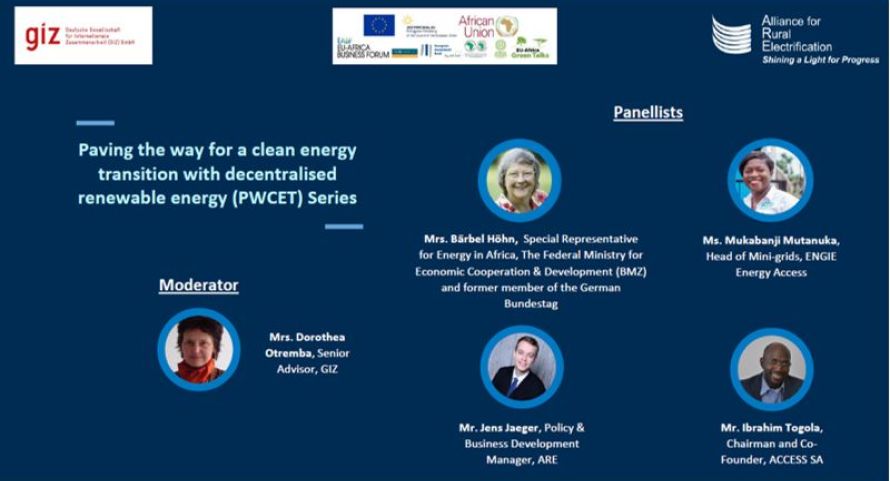Energy connects – launch of GBE-ARE web seminar series

On 20 April 2021, the Alliance for Rural Electrification (ARE) and Green People’s Energy (GBE) launched their web seminar series “Paving the way for Clean Energy Transition with Decentralised Renewable Energy (PWCET) ” at the digital EU-Africa Business Forum. The first of in total 10 events had more than 200 participants discussing the decentralisation of African energy systems and what preconditions and financing models are necessary for a further adoption and scaling of mini-grids.
It was clear to the participants that decentralised renewable energy (DRE) is crucial to meet the growing energy demand in sub-Saharan Africa and to develop rural regions, not least because the DRE sector proved to be resilient even during the Covid19 pandemic. In his statement, Jens Jaeger, Policy & Business Development Manager of ARE, explained which obstacles nevertheless emerged through the pandemic and how a better recovery of DRE could be set up.
Bärbel Höhn, Special Representative for Energy in Africa for the German Federal Ministry for Economic Cooperation and Development (BMZ), emphasised the importance of renewable energies for achieving the climate goals and the Sustainable Development Goals (SGDs) and presented the Ministry’s Green People’s Energy for Africa initiative in this context. She also described the German experience with the “Energiewende” and underlined, next to citizen’s participation, three other important aspects for its success: Strong political will, supportive framework conditions and tailor-made financing mechanisms.
Ibrahim Togola, chairman and co-founder of ACCESS SA from Mali, spoke about the challenges faced by entrepreneurs, associations and the people on the ground. Electricity must be affordable for the inhabitants of rural Africa and energy security must be guaranteed. Still many people are dependent on traditional biomass. For the development of renewable energies a lack of technical knowledge and training capacities, among other things, need to be overcome.
Where DRE systems are installed, the consumption of energy increases, at least in Zambia, according to Mukabanji Mutanuka’s experience. She is the Head of Minigrids (Zambia) at ENGIE Energy Access. Reliability and scalibility are key to fostering and then meeting an increasing energy demand. At the same time, it is crucial to promote the productive use of energy and the development of new services.
Among the large number of participants where private individuals as well as representatives of cooperatives, universities, associations, companies and ministries.
About the PWCET webinar series:
The web seminar series “Paving the way for Clean Energy Transition with Decentralised Renewable Energy (PWCET)” aims not only to contribute to awareness raising, but also to strengthen the mutual exchange of information and knowledge between the numerous actors in the decentralised renewable energy sector.
Each web seminar lasts between 90 and 120 minutes and is dedicated to different topics. The variety of topics ranges from the productive use of energy, e.g. further processing of food, as well as its cooling or drying, to solar-powered irrigation systems, financial instruments and e-mobility, as well as education and health. The topics finally selected will also be based on the feedback from the participants and their questions.
The next digital event in this series will take place on the topic of productive use of energy at the end of June / beginning of July. The exact dates will be published on the GBE website, among others.
We look forward to meeting you there!





